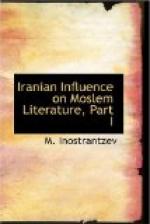the latter with over much zeal, translated a series
of Pahlavi writings into Arabic including the Khoday-Nameh.
He was a courtier, and passed for a good Arabic poet
and one of the best rhetorical writers of his time.
The famous Wazir Ibn Mukla counted him among “the
ten most eloquent men.” He must consequently
have striven to suit his rendering of the book of
Persian kings to the taste of his contemporaries.
But we have no sufficient grounds to assume that he
introduced arbitrary and material alterations into
his translations or even that he greatly elaborated
the rhetorical passages of the original text or invested
them with an altogether different garb. Such a
suspicion is contradicted by the coincidences with
other sources which, like Firdausi, are independent
of him. There is little probability of Ibn Mukaffa’s
work being again brought to light in its entirety.
But on the other hand, it will indeed be possible
to gather together in course of time more and more
stray passages belonging to the book; though it is
to be feared, unfortunately that these fragments will
prove more to be preserved as efforts of rhetoric
than because of their intrinsic value. A few
extracts of this nature we find in Ibn Kotaiba’s
Oyun-al Akhbar. Among these citations
which I owe to the goodness of Rosen, there is one
tolerably long on the death of Peroz. Now the
same fragment, little curtailed, is in the chronicle
of Said bin Batrik or Eutychius, the patriarch of
Alexandria. We should, therefore, be inclined
from the first to derive other information in Eutychius
on the Sasanides from Ibn Mukaffa. And our predisposition
is supported by the circumstance that the history
of the dynasty as given in a manual by the same Ibn
Kotaiba and which is styled Kitab al Maarif,
brief as it is, betrays as in the instance of the
reign of Peroz, all through such an harmony with Eutychius
that here two independent authors must necessarily
have drawn upon one and the same original; and that
original source can be no other than the production
of Ibn Mukaffa. The abstract in Eutychius is very
unequal being in some parts exhaustive, in others much
abridged. The narrations as preserved in Tabari,
which correspond to the statements in Eutychius and
Ibn Kotaiba and which consequently go back to Ibn Mukaffa,
are of a similar nature though Tabari gives in addition
other parallel reports. Tabari, however, did
not himself use Ibn Mukaffa’s work, but for
the History of Persia, among other authorities, employed
by preference a younger work which represented another
version together with excerts from the former.
This can be inferred from the fact that the anonymous
Codex Sprengers 30, which and Tabari are mutually
independent, shows quite the same combination of two
main sources and so far as the section in question
goes, can be utilised and treated as a new manuscript
of Tabari. Both have relied almost to the letter
upon the presentment which emanated partly from Ibn




